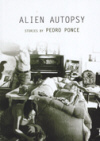Alien Autopsy
There’s something to be said for the matter-of-fact voice that short-form fiction so effectively encourages. With it, images and situations that would be surprises if not entirely doubted are accepted without a bat of the lash from the narrator.
There’s something to be said for the matter-of-fact voice that short-form fiction so effectively encourages. With it, images and situations that would be surprises if not entirely doubted are accepted without a bat of the lash from the narrator.
At least that’s the voice Pedro Ponce acquires for his collection from Cow Heavy Books, Alien Autopsy. The entire book—its sparse design, credulous speakers in times of unfurled fantasy, and fruitful words in well-tilled sentences—seems to state: this is how it is. From the very beginning: “It’s hot, I said, watching palm trees bake in the sun,” opens the collection in “Haunted Car”:
The passenger side window opened. A cool breeze lifted strands of my mother’s hair and chilled the dampness at my temples.
How did you do that? I asked.
This is a haunted car, my mother said. The windows won’t open unless you ask the ghosts for permission.
It’s fitting that childish faith introduces readers to Ponce’s world, initially establishing a sense of wonder with which to accept the incoming Secret Satans (as opposed to Santas), virgins with healing powers, and run-ins with other-dimensional selves.
However, as the collection’s invisible over-arcing plot moves into adulthood, the same straight acceptance of the fantastic is reused by its speakers to accept their inevitable loneliness. In the title story, the host of a singles’ mixer asks if the narrator has ever been in love; the narrator explains the plot of a science fiction film:
My host discreetly checked his watch. I guess some people are better off alone, he said.
Precisely, I agreed. In those cases where the computer simulation fails to take, the bodies are raised for feed. But the longer brains are allowed to develop unimpaired, the more likely the conspiracy will be discovered. Renegade efforts to expose the aliens make up the plot of The Harvest as well as its admittedly inferior sequels, Harvest 2: Rebirth and Harvest 3: Blood Spawn.
The party broke up earlier than expected.
The sighs of acceptance repeated in story after story build into complacency and stagnancy.
Individually, the stories of Alien Autopsy show Ponce’s ability to maneuver language, to establish limits, then to bend and fold them to his will—one of the joys of short-form literature. But there’s something to be said for his ability to promote themes across a series as well.
Meanwhile, one wonders what his speakers might do in a page or two more.





